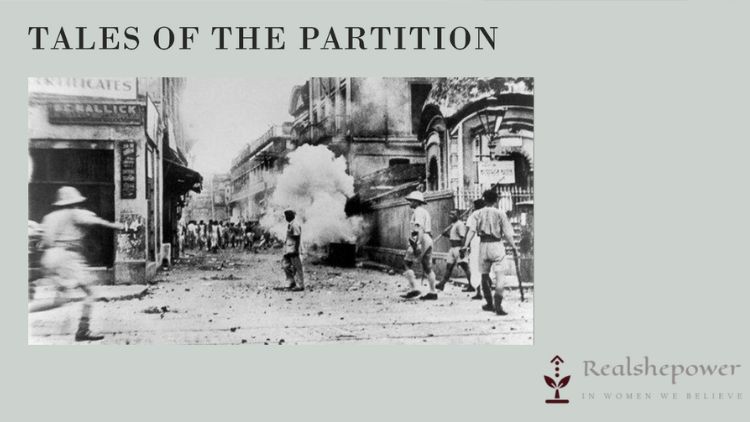Lahore, 1947.


In the heart of Lahore, Raghav, a middle-aged bookseller, lived a life of contentment. His modest shop, ‘Purani Kitabon Ki Duniya’, was a haven for intellectuals, poets, and students. Whether one sought ancient scriptures, progressive literature, or rare poetry, Raghav’s store was the place to be.
The evening chatter in the shop often revolved around India’s impending independence. However, as days turned into weeks, the tone of these conversations shifted from hopeful aspirations of freedom to the divisive politics of Partition.
One fateful morning, as Raghav was dusting off his books, he overheard whispers from the tea stall next door. Lahore might end up in Pakistan. Panic gripped him. Lahore wasn’t just his birthplace; it was the essence of his identity.
Soon, streets that once echoed with ghazals and bhajans became hotbeds of tension. Mobs roamed freely, and tales of violence from nearby villages began to pour in. The city of love, poetry, and shared history was at the brink of a catastrophic divide.
One evening, Raghav’s close friend, Aftab, a passionate poet and a regular at his shop, brought dire news. A mob, incensed by rumors and looking to settle scores, was heading towards their street. Aftab, being Muslim, insisted that Raghav and his family take shelter in his home.
The night was long and fraught with danger. From Aftab’s attic, Raghav watched in horror as his beloved shop was set ablaze, the devouring flames consuming his legacy. But the nightmare didn’t end there. The mob, having torched several homes, dragged out men, young and old, subjecting them to a violent frenzy. The heart-wrenching screams and cries for mercy still echo in Raghav’s ears.
Dawn brought a deceptive calm, but the city was forever altered. Raghav, with a heavy heart, decided to migrate to India. Aftab, torn between the safety of his friend and the loss of a bond built over years, arranged for Raghav’s passage on one of the ‘Refugee Special’ trains.
The train journey, intended to be a passage to safety, was a harrowing experience. At each station, they faced mobs thirsty for blood. Families huddled together, praying for a safe passage. Children, unable to grasp the gravity of the situation, clung to their mothers, sensing their fear. As the train approached Amritsar, a massive mob halted its progress. Despite the barricaded compartments, they managed to break in. What followed was a massacre. Raghav, hiding beneath the seats and covered in the blood of fellow passengers, played dead, hoping to survive.
Raghav eventually reached Delhi, a city overwhelmed with refugees. The trauma left him a shell of his former self. Every night was a battle against the demons of that train journey, the flames of his shop, and the lost vibrancy of Lahore.
In the subsequent years, Raghav tried to rebuild his life. He opened a small stall selling books, but ‘Purani Kitabon Ki Duniya’ was more than just a store; it was an era, and that was gone forever. Though he found relative peace in India, the scars of partition haunted him till his last breath. He often narrated his tale to youngsters, not to instill hatred but to emphasize the costs of division and the value of peace.
Raghav’s tale is not just one man’s sorrow. It’s a lament for a lost era, a dirge for a divided land. It reminds us of the depth of pain etched in the pages of history, urging us never to forget, never to repeat.
A Call to Our Readers: Share Your Story
Partition was not merely a line drawn on a map, but a scar left on the hearts of millions. The legacy of those traumatic times lives on in the memories of survivors and the tales handed down through generations. While the pain and anguish of that era might be overwhelming, there’s healing in remembering and sharing.
We firmly believe that to truly understand the depth of that experience and to heal collectively, it’s essential to bring these stories to light. Trauma can fester in silence, but sharing has the power to heal wounds, bridge divides, and remind us of our shared humanity.
If you or your loved ones have stories from the Partition, we urge you to share them with us. Send your narratives, memories, and anecdotes to admin@real-shepower.com. Let’s not allow these tales to fade into oblivion. By sharing, we not only pay homage to the resilience and spirit of those who lived through the upheaval but also provide a space for understanding, empathy, and collective healing.
The stories of Partition belong to all of us — they are a testament to our shared past, our resilience, and our hope for a harmonious future. Let’s give them the voice they deserve.

Wonderful web site. Lots of useful info here. I’m sending it to a few friends ans additionally sharing in delicious. And obviously, thanks to your effort!